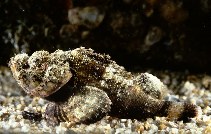| Family: |
Scorpaenidae (Scorpionfishes or rockfishes), subfamily: Scorpaeninae |
| Max. size: |
21 cm SL (male/unsexed) |
| Environment: |
reef-associated; marine |
| Distribution: |
Western Indian Ocean: Kenya and Mozambique to islands in the western Indian Ocean. |
| Diagnosis: |
Dorsal spines (total): 12-12; Dorsal soft rays (total): 9-9; Anal spines: 3-3; Anal soft rays: 5-5. A black spot nearly as large as eye on inner surface of pectoral fins near base of first 5 rays; no black mark inside mouth at front of upper jaw. Ascending process of premaxilla narrow, its maximum width 1.8-2.2 in orbit diameter; a series of papillae or nodules (sometimes on a low ridge) across interorbital space between supraocular spines; nasal spine single (Ref 42181). |
| Biology: |
Usually found immobile at the bottom camouflaged among rocks and coral. Hunts by ambushing prey (Ref. 5503). Unlike most scorpaenids, the sting from the dorsal spines of this species can be painful but does not pose any real danger to the victim (Ref. 5503). Sold fresh in small quantities in markets. |
| IUCN Red List Status: |
Least Concern (LC); Date assessed: 04 March 2015 Ref. (130435)
|
| Threat to humans: |
traumatogenic |
Source and more info: www.fishbase.org. For personal, classroom, and other internal use only. Not for publication.

